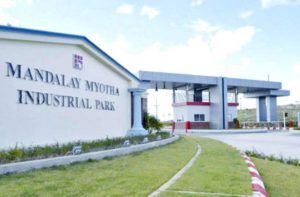MMID has up to 1600 shareholders, of which 160 are local farmers.
“We sold shares at K10,000 per share before. In last year’s meeting, we decided to divide each share into 10 shares so an investor who bought one share for K10,000 in the past could own 10 shares at K1,000. Over the last few years, we have paid dividends of up to 55 percent of the share value. Today, the price of per MMID over-the-counter (OTC) share is between K1300 and K1500,” U Tun Tun Aung said.
MMID shares first started trading OTC on April 3, 2003. MMID paid out 10pc of its profits in dividends during the first annual shareholder meeting, 12.5pc in second annual meeting and issued bonus shares in the third annual meeting, he said.
“A total of 7.9pc in profits were paid out this year. But we aim to further boost the share price value rather than distributing the profit. In addition, we will try to make an Initial Public Offering on the Yangon Stock Exchange,” U Tun Tun Aung said.
He added that MMID should be ready to list by next year. “Actually, we are ready to list, but the stock market is not ready yet. More investor education is still needed to improve trading and liquidity.”
The Memorandum of Understanding (MoU) for MMID, Mandalay Region, was signed on December 9, 2011. It was permitted by the Myanmar Investment Commission (MIC) in November 2012.
Development and construction work for the project first began in 2013 across 260,000 acres of land. Around 12,000 acres, or 4.6 percent of land space is being used by factories across several sectors to generate revenue.
As of last year, there were seven international factories operating in the Mandalay Myotha Industrial Park. These include animal feed, plywood, snacks and concrete factories run by investors from Indonesia, Hong Kong, China and Denmark which have been approved by the Myanmar Investment Commission. Some local private investors have also set up shop in the area.
“A Chinese car maker entered this year. They will have completed their installation process by April, and will start production in May. As fruits are abundant in Myanmar, a Japanese fruit-drying factory will also be opening up. I think the number of factories will increase to 20 in Myotha Industrial Park by this year or early next year,” said U Tun Tun Aung.
Meanwhile, an international standard 18-hole golf course has also been completed in the industrial park. The Simikhone Port, which can load up to 50 tonnes of cargo, has been completed as well.
Currently, local investments totaling K338 billion and foreign investments totaling K508 million have been channeled into Myotha, which is running with over 2500 staff.
“We think we will be successful as the US and China are in a trade war and there are many problems in international community. As our country is stable we believe many investments will come to our country but no matter what project we do, we will need government’s support, encouragement and administration to be successful,” said MMID chair U Aung Win Khine at the fifth shareholders’ meeting.
At the Mandalay International Commodities Expo and Economic Forum in third week of March, Mandalay Regional Chief Minister Dr Zaw Myint Maung highlighted Mandalay’s top five projects with the most potential for growth and development. These included the Myotha Project.
Source: Myanmar Times
 State Counsellor Daw Aung San Suu Kyi attends the Second Belt and Road Forum at the invitation of Chinese President Mr. Xi Jinping and to pay a goodwill visit to Cambodia at the invitation of Prime Minister, Samdech Akka Moha Sena Padei Techo Hun Sen.
State Counsellor Daw Aung San Suu Kyi attends the Second Belt and Road Forum at the invitation of Chinese President Mr. Xi Jinping and to pay a goodwill visit to Cambodia at the invitation of Prime Minister, Samdech Akka Moha Sena Padei Techo Hun Sen.




 The Union of Myanmar Chamber of Commerce and Industry (UMFCCI) and Mercosur-ASEAN Chamber of Commerce (MACC), which is based in Argentina and Indonesia, was signed the Memorandum of Understanding (MOU) at the UMFCCI office for trade and investment promotion in April, 2019.
The Union of Myanmar Chamber of Commerce and Industry (UMFCCI) and Mercosur-ASEAN Chamber of Commerce (MACC), which is based in Argentina and Indonesia, was signed the Memorandum of Understanding (MOU) at the UMFCCI office for trade and investment promotion in April, 2019.


 The inauguration of the Mandalay International Trade Fair & Business Forum 2019 was held, at the Mandalay Convention Centre (MCC), Mandalay Region. The event took place with the aim of boosting trading sectors and investment enterprises in the region.
The inauguration of the Mandalay International Trade Fair & Business Forum 2019 was held, at the Mandalay Convention Centre (MCC), Mandalay Region. The event took place with the aim of boosting trading sectors and investment enterprises in the region.